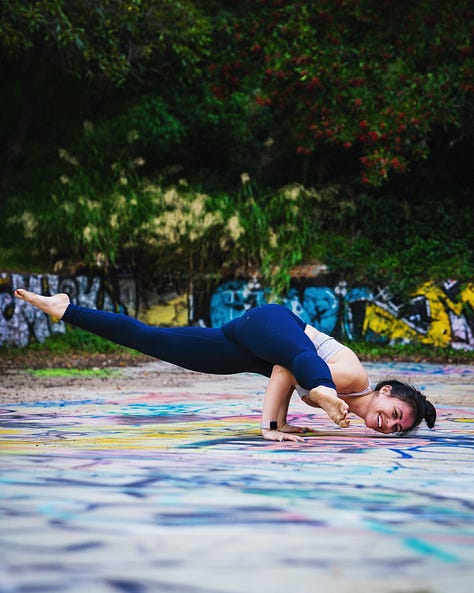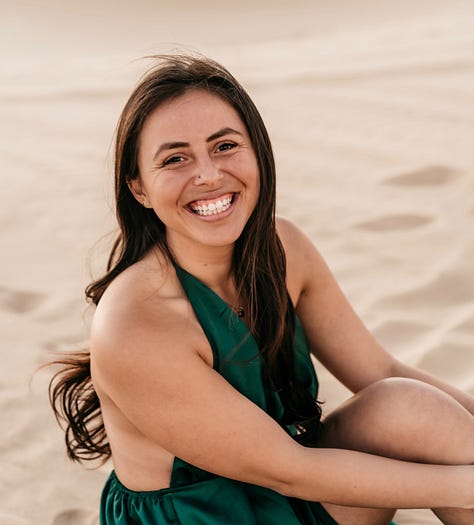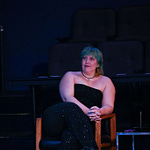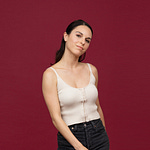Everyone please welcome my yoga teacher and new friend Marissa Procelli to A Broadway Body: Continued Conversations! I’ve been taking Mar’s yoga classes for about two years now, and it wasn’t long before I recognized she approaches her teaching through a healthy body image lens. Her language in her classes spoke to me and allowed me to further deepen my connection to my own body in my practice.
Mar is an incredible leader, and I’m so excited to share our conversation with you. There are so many chunks of wisdom hiding in here for you, and I hope if you’re in the South Bay/LA area, you come take one of her classes to experience her magic for yourself!



“ It's really hard in this industry to not have people look at your body as your business card because, as a teacher, whether it's privates or yoga or strength training or Pilates or whatever, when they come to your class, a lot of people, whether they mean it consciously or not, look at your body as your business card. I can teach things that I don't know how to do in my own body. I can prep you and get you all ready to go and work into the splits. Do I have my full splits? No, I do not. My hope is that for people to understand, as teachers, it's about our knowledge, it's about what we've studied, it's about how much work we put into creating either a flow or a playlist or a type of class. My hope is that people start to see the teacher as what they teach and not what they can do in their own practice.”
- Marissa Procelli
Marissa Procelli: So when I was two years old, I was diagnosed with Rheumatoid Arthritis. And so, with that, your joints tend to stiffen and swell and you lose your range of motion in a lot of parts of your body. And growing up with that, I was always in and out of remission, and because of that, I felt like I spent most of my life numbing my body because I was told that I shouldn't feel pain. And so, with all my medications, I was constantly numbing and subsiding the pain, but because of that, I was numbing everything, yeah? And your body's supposed to have a conversation with you, and you're supposed to get input from your body.
So growing up I was very active still. I played a lot of sports. Even when I was in the depths of my RA, I always found an alternative. I wasn't cleared to do land sports in high school halfway through. And so, I quit volleyball and basketball, which volleyball I played for, like, five years, and then I just switched to water polo and swim, and I was like, “Okay, I guess I can't do heavy-impact sports, but I can go in the water. So movement was always something that I really enjoyed.
And then college happened, and at least my college experience was a lot of going out, a lot of eating fast food, a lot of drinking, and, yes, academics, and I had a lot of great experiences. And I was an athletic trainer or assistant for the football team there. So I did learn about the body, and I was a public health major. But yeah, I was going out, I was having fun. So then when I moved here to LA, I was a very swollen version of myself just because I didn't really understand how to take care of myself.
So then when I started yoga, I was thinking, “Oh, this –.” Well, first, I actually didn't like it in terms of, I thought it was so challenging and it wasn't my vibe. But then I realized, after the class, I felt better in my body, and I said, “Oh, I haven't felt good in my body, or I haven't felt period in a long time.” So that was in 2016, and then I was in a really stressful job at the time as a behavior therapist, and I did in-home services, and I was getting a lot of anxiety attacks. And so, I started going to yoga more, and I was like, “Okay, I want to do teacher training.”
So I did teacher training, and at the same time as doing teacher training, I'm injecting myself once a week with my arthritis medication. I'm on what's called Methotrexate, which I was on for 20 years off and on, which is a type of chemo. But it helps regulate RA in the body. And so, I'm going from very westernized medicine to learning about yoga, which is very different.
And so, then after I did teacher training, I was like, “Okay, how can I incorporate what I have learned in my choices, in how I move my body, how I fuel my body, how I rest my body versus just relying on medication?” So then, I went to a nutritionist. I switched my diet, which was hard. It was like an elimination diet, so I took out things, brought it in, and so, then I figured out what worked. And that was in 2018, like I said, injections on the chemo meds. Six months later, I got off, and I have not been on it since.
Megan Gill: Oh my god, my heart.
Marissa Procelli: So that was 2018, and it's 2025, and I have not had one ounce of medication for my arthritis since.
Megan Gill: That is incredible.
Marissa Procelli: Yeah. So the downside part, though, is that because of my diet, I ended up dropping a lot of weight quite quickly, so much so that I dropped I think it was, like, 23 pounds in two and a half months. And I'm a small human. I'm five two. I haven't weighed myself in years, so I don't know how much I weigh, but like I don't have a ton to lose. And while my body was feeling great about not being on meds anymore, the compliments, which I know you hear the word compliment and you're like, “Oh, that's nice. That's a good thing.”
Megan Gill: But I know exactly what you mean. Yes.
Marissa Procelli: And literally everyone was like, “What are you doing? What?” I still remember to this day walking into my yoga studio and another student looking at me and said, “Oh my god, you lost half of yourself. What did you do?” In like a I-want-to-know-the-secret type of way.
Megan Gill: Oh my god.
Marissa Procelli: Yeah. So what was initially a good thing then started turning into me getting very intense about my diet, so much so that one of my best friends, still best friend, who's a teacher, a fellow teacher who also has a past of body image and eating disorders, she reached out and was like, “Hey, I'm worried about you, and I just want to check in and see what's up.” And she is a very vital component as to what pulled me out of a very slippery slope.
So after that, I started seeing a nutritional therapist and kind of going back onto being balanced. But I was so hardcore about the diet for my RA that it then wasn't about RA anymore. It was about everyone giving me compliments and me wanting to continue that and almost this weird feeling of like, “I feel like if I start gaining weight again, I'll let them down.” It was very weird expectations.
Megan Gill: Especially as the person who is leading a movement space where people are looking to you as like their, not mentor, but the leader in that area, yeah.
Marissa Procelli: Yeah, and also like what I wrote on the notebook was I just was talking about it with a friend, it's really hard in this industry to not have people look at your body as your business card, because as a teacher, whether it's privates or yoga or strength training or Pilates or whatever, when they come to your class, a lot of people, whether they mean it consciously or not, a lot of times they look at your body as –
Megan Gill: The projected results or something like that?
Marissa Procelli: Exactly. Yeah, as, like, your business card. So it was very tough, and now I'm kind of – I felt really good about it. I did have a bit of a low recently because, like I said, I got sick when I got back. Every time I get sick, after, it's always like, “Oh, like you look great.
Megan Gill: “I was just sick!”
Marissa Procelli: Yeah! Malnutrition? Is that where we're going for? Yeah, so there are still moments where I have to really pause and back up, and honestly, a lot of my fellow teacher friends, we chat about it every once in a while of the comments that people will make or the things that they expect from themselves based on us. Yeah, I mean, it's definitely there. It's not something we make up. It's a very active conversation, which is hard to, like, navigate sometimes of how to change that topic or almost make it a learning moment in moments.
Megan Gill: Mm-hmm. Like kind of steer the conversation, so that they walk away being like, “Oh, maybe that’s not how I should – maybe I shouldn't speak to my teacher in that way,” not from a disrespectful standpoint.
Marissa Procelli: No, and it's all good intentions, right? I do feel that. A lot of people, especially towards me, I don't think they're being malicious in any way, but it's more of we're so used to that.
Megan Gill: That conversation is so embedded in our culture.
Marissa Procelli: Yes, it is.
Megan Gill: It's everywhere! It’s everywhere.
Marissa Procelli: Yeah, and then I come from a Hispanic family, so it's kind of the opposite. When I go home, a lot of it is like, “You need to eat more.” A lot of the “endearing” terms are gordo and flaco, which is fat and skinny. And they are originally like endearing terms. They really are. But now we're in a world where they didn't really age well.
Megan Gill: Mm-hm, totally. And that they could be triggering said under certain circumstances, yeah.
Marissa Procelli: Yeah. So it is, it's a lot of navigating other people's impressions of you. And again, a lot of it I don't think is bad. I think it's just so ingrained in us to just say something out loud.
Megan Gill: Yep. About our bodies, about the way people look.
Marissa Procelli: Comparing…
Megan Gill: Oh my god, yes. Or even like you said earlier, the simple compliment that you think is a compliment, but when you're complimenting someone's appearance, okay, I mean, I do it. And I like having this conversation because it's like I've really challenged myself to maybe not pay a compliment about someone's appearance. Even if I'm thinking something I like about their appearance, just to challenge myself to think differently and challenge myself to not fall into that trap because I think it's so easy for all of us. And of course, and it's okay to be like, “You're beautiful. Your skin is glowing.” But still.
Marissa Procelli: Yeah, exactly. It’s funny, the way that I've really tried to get out of that, a lot of times I start to look at what people are wearing, in terms of jewelry or outfits. Because for me, honestly, if someone gave me a compliment about my outfit or my jewelry, I get way more excited because I'm like, “Oh, this is something I chose. This is like something that I actively chose to put on my body, and someone else likes it.”
Megan Gill: Right, which then is a reflection of me.
Marissa Procelli: Yeah, like my personality or how I'm feeling today. So a lot of times I like to give a lot of outfit slash jewelry compliments.
Megan Gill: I like that.
Marissa Procelli: I love an outfit compliment. And I like to tell people – it's kind of weird. My husband's always like, “You just talked to that person that just walked by you.” I was like, “Yeah, I liked her hat. I wanted her to know that I liked her hat.”
Megan Gill: But do you know that that could change someone's day? Truly.
Marissa Procelli: Yeah, exactly. Yes, so that's why I get excited about it because I'm like, I'm like, if I genuinely like it, I want them to know so they could feel good, you know?
Megan Gill: Yeah, and I think we need more of that in the world, truly. And I think sometimes – I used to be very quiet, and I think it stemmed from this place of being really overly self-conscious and just so concerned about what every single person thought of me. And the minute I – I mean, not the minute, it obviously took so much time to get to the place where I can pay someone a compliment and not feel insecure or shy about it.
Marissa Procelli: Yeah.
Megan Gill: Because it also makes me feel good to genuinely give a compliment to somebody. It’s like, “Great!”
Marissa Procelli: Yeah, like we're both doing this. Well, and also I say this too, a lot of times in classes I'm shopping in my head. I'm like, “That's a really cute outfit.” “Oh, I didn't know that brand came out with that.”
Megan Gill: I bet. I love it.
Marissa Procelli: There's a lot of moments where I'm like, “Wow. Yeah, that's a cute color. I like earthtones.” Yeah, so I do, I have really tried to shift to that.
Megan Gill: Mm-hmm. Yeah, I like that. And I also think it's so cool to hear that you do come together with other teachers and do converse about it.
Marissa Procelli: Yeah.
Megan Gill: And I think that's also how we work to change the narrative in a community and in a space when multiple people are showing up with this new approach and this new vision for how it could be different. To then maybe change that one student's mind that day, or show them how it could be done differently.
I know that like in my friend groups, a lot of times, all my friends at this point, now that I'm doing this a little bit more publicly, having these conversations and sharing them with the world, a lot of my friends know I'm the body image girlie. And so, they'll say something and be like, “Oh, well I know you probably don't approve of this!” And sometimes I'm like, “Okay, like let's be discerning.” There's the awareness there, but then there are times with certain people where I kind of do the same thing as you, and I allow that learning moment to be there and be like, “Hey, maybe we don't have to do that,” or a lot of times it's about themselves. They'll be putting themselves down.
Marissa Procelli: Yes! It’s really hard, and you've heard me say it a bunch of times in classes. What's really hard about some of the classes is like multiple people can be showing up to a class and doing the same thing. Some people are doing it as a celebration of their bodies. Some people are doing it as a punishment. Some people are “rewarding themselves,” and that's one of the hardest things for me is that I want to facilitate a space where hopefully everyone is celebrating their bodies. But I do know, unfortunately because I have been that person, so that's why I know, is I have been the person that goes to class as a punishment. And so, that's why I bring it up so much because so many people are so hard on themselves, including myself. I am not perfect.
Megan Gill: Me too.
Marissa Procelli: There are ups and downs. It's not like I'm like, “Oh, now I'm super confident!” Last year, I got married, and that is one of the biggest – at least for me, my wedding dress – first off, just picking a dress. Not even me fitting into it, just like figuring out something I liked. I did one day with my core group of people, a lot of them were from out of town. I did a quick dress fitting because it's like that's what you're supposed to do. The rest of the time I went by myself because I didn't need – I was already in my head so much. I did not need outer opinions when I know, again, they're coming from a good place, but I knew it would not be healthy for me.
Megan Gill: I think that's so important that you were able to be aware of that and take care of yourself in that way, almost as, “This isn't about anyone else. This is me. This is my day. This is my dress. This is how I feel.” And then I can imagine if you're not in the best mental space when you're trying it on and getting alterations and XYZ, then to be putting it on on the day, it's like only a precursor for how you’re gonna feel.
Marissa Procelli: Yeah, exactly. Exactly.
Megan Gill: Yeah. Wow.
Marissa Procelli: You know, so I think definitely as a teacher, that's like the hard thing is knowing that there are people – it's okay that they're struggling. That's not necessarily what I'm saying, but knowing that some people are walking in and like being so harsh to themselves.
Megan Gill: Yeah, especially because you teach Sculpt. At least at YogaSix you teach a lot of Sculpt and Flow.
Marissa Procelli: Yeah, I teach a lot of Sculpt in general.
Megan Gill: And even with Pilates too it’s a lot of – I love Sculpt and Flow, but I'm a big Hot girlie because I'm like, “Okay, I don't need the intensity.” I am in a very –
Marissa Procelli: And you know what's coming. You know where you're going.
Megan Gill: But also I'm in the place in my body image journey in my life where I am going to feel mentally well, to feel strong. I have muscles now that I did not have two years ago before I started!
Marissa Procelli: We love that! We love muscles.
Megan Gill: But I can imagine a lot of people coming into Sculpt are coming in with the mindset of like, “Okay, I need to be here in the most intense class. This is the class that I have to go to.”
Marissa Procelli: Yes, exactly.
Megan Gill: And sometimes it's maybe they don't have the best relationship with it because it's the one that's gonna kick their ass the most.
Marissa Procelli: Yeah, or burn the most or whatever, yeah. Yeah!
Megan Gill: But Slow Flow can be just as beneficial in different ways. I don't know the ins and outs, but you know.
Marissa Procelli: Yeah! No, I mean, they are all – I always tell people, for example, with Slow Flow, I'm like, “Slow does not mean easy. It just means slow. They’re not synonymous.”
Megan Gill: Slow Flow kicks my ass, I will say.
Marissa Procelli: Yeah! So I think it's a very interesting line of figuring out, “Okay, how do I facilitate a space the way I want? Because I mean, for example, we're going into the summer months. I cannot stand when a fitness instructor or a movement teacher or whatever you wanna call yourself is like, “Let’s get ready for our summer bodies.” I'm like, “Oh my God. Get me out of this class.”
Megan Gill: Same. Yes, no, same. It's quite cringe.
Marissa Procelli: Yes!
Megan Gill: And also so detrimental.
Marissa Procelli: Yes, it's not helpful. Most likely people in there that are insecure are going to feel even more insecure right after that statement.
Megan Gill: Right, because then also like what is a summer body? Eye roll!
Marissa Procelli: Exactly, what does that even – ?
Megan Gill: Like, what? Oh, so does that mean that my body – I've been there, again, myself. Like, “Right now my body is not a summer body? All the things that I'm feeling insecure about, I need to change? I need to fix?” When in reality, it's like, how do we look in the mirror – at least for us at YogaSix with the mirror – I imagine a lot of other studios have them too.
Marissa Procelli: Yeah, a lot of studios do.
Megan Gill: Yeah, it's like looking in the mirror and being able to embrace myself and embrace the things that I maybe don't love about myself innately, or that one thing I want to change, or whatever it is. And just have radical acceptance that it's part of me, and it's here with me, it's allowing me to move.. Oh my god, I'm here, I'm moving!
Marissa Procelli: Yes! And that's why a lot of the times the intention that I use is, “This body is the one that got you through this class, not the one that you're looking for, if you are. This one just worked out. This one just moved. This one just worked. So enjoy this one.” But, you know, sometimes we're so pushed to look into the next thing to make our “goal.”
Megan Gill: Well, I’m like, “What is that? What is that?” I truly don't believe that there's ever going to be a time that we are able to reach that end goal or that goal.
Marissa Procelli: No.
Megan Gill: Every time you get there to that arbitrary in place, there's something else. So why are we – for me, I'm like, “Why are we fighting it? Why can't we try to do more of the work?” Because the work is so hard, but yeah.
Marissa Procelli: Yeah, a lot of us teachers, we do talk about it, and you know, like I said, there are a lot of teachers that feed into it. So it's kind of like finding the teachers that align with you.
Megan Gill: To talk about it with, kind of? There have been instances for you then where you're like having these conversations with maybe a group of teachers and like people will disagree or?
Marissa Procelli: I wouldn't disagree. I would say a lot of there have been moments where a teacher's talking badly about themselves.
Megan Gill: Yeah. Okay, yes.
Marissa Procelli: And you’re like, “Okay, this is stemming from something deeper.” But also sometimes you have to realize that you might not be the container that they need. And so, that's also a line to play into, is that you might not be the person that they want to hold space for them, or they just might not want to dive into it at all.
Megan Gill: Oh, totally. And then that makes me just think of just how impactful it is then for you to be – the way you speak at the beginnings and ends of your classes to this room full of people or like 30-ish people, a lot of times, a lot of those people probably might not want you to be the person saying the stuff to them.
Marissa Procelli: Yeah, a hundred percent.
Megan Gill: But at the same time, on the flip side of the coin, I think it's so, so, so important that you are and that you're allowed that space to say those things, because as a student of yours and someone who's been in those spaces where the stuff you're saying really hits me and impacts me, I can only imagine how it's sitting with other people that really, really, really, really, really need to hear some of that stuff, you know?
Marissa Procelli: Yeah, and there is. It always surprises me, the people that come up after class and say that something resonated with them because a lot of times it's the people that are quieter or that, you know, haven't really talked to me before or things like that. So that's always been really nice. I mean, all of it is great. Well, I shouldn't say all of it. Sometimes it's not great, but most of the time it is great.
Megan Gill: Because then it opens up a door for those people that might not have even come up to say hello to at least then engage with you, which how cool is that?
Marissa Procelli: Well, I remember I did talk about my wedding dress one time in class, and there were two other women that were on that were also getting married, and both of them who've never talked to me outside of class before were like, “Oh my god, I literally had this experience last week. I was just thinking about this.”
Megan Gill: Ah, chills.
Marissa Procelli: Yeah, and I'm like, okay, you know, we're talking about it.
Megan Gill: We're not alone!
Marissa Procelli: Exactly. Yeah. So I think those are nice moments when people that you haven't really connected with one-on-one end up doing that.
Megan Gill: Oh, absolutely. Agreed. So okay, you said before we started recording that a lot of times people will ask if you write down the magic that you say in class afterwards, and you said no. It's probably just in your body at this point, and your mind is geared towards speaking in these ways. But what do you pull from? What do you kind of try to implement when you are speaking?
Marissa Procelli: Man, honestly, it could be the smallest to the biggest things. Sometimes an intention will literally come from a conversation I had right before class, and sometimes it'll be something that I've talked about for a few days. I am someone who very much uses my own life experiences. Not every teacher's like that. I also, because you are trying to – you know, there's a line in terms of when you're in a studio, and there's a lot of different walks of life in there. I will subtly talk about the climate of the world. I will try not to name it, but I will definitely allude to it.
Megan Gill: Important also, in my opinion. So important.
Marissa Procelli: Yeah, and so, but a lot of times it's what I'm going through in that moment, or, it sounds silly, but it's almost like what I'm feeling in the room. And so, by that I mean sometimes the energy's really high. Sometimes it's low. Sometimes I see a lot of engagement with each other. Sometimes I see it's a little quieter. And so, I think that also plays into what I say. I am a bit of an oversharer, so I can get pretty deep pretty quick.
Megan Gill: She’s open. She’s vulnerable.
Marissa Procelli: I am. I am. I’m giving Cancer.
Megan Gill: She's leaned in.
Marissa Procelli: Yes, yes. And so, but with that, I've created so – like this! Because I've opened up, you feel comfortable asking about this. I can’t tell you, I've had so many students where I've created such a bond with them because of my vulnerability. So I feel like I'm just getting positive reinforcement. So I just keep doing it, even if those things are hard because, again, other people are going through hard things, and so, they just want to be seen.
And, also too, I would like to think that I come from a space where I don't like being seen as a guru. I don't like being seen as on a pedestal. I really – maybe it's because I'm insecure, but I just don't like that dynamic.
Megan Gill: I think that’s very fair. I don't like it either. I exist in a lot of spaces that are not structured that way, and I think it's really important.
Marissa Procelli: Okay, thank you because it’s not my – that’s not the vibe I'm giving, right? So a lot of times I tell people I am sharing because I'm living life next to you, not because I'm living above you. It's because we are going through life side by side and trying to figure this out together. Not because I've gone through it and so I know exactly what it is.
Megan Gill: And you should look to me because – and then I think that also puts the pressure on you and all of the sense to be this thing that –
Marissa Procelli: Yeah, and I’m like, “No. I don't need that. I'm trying to figure out my own stuff.”
Megan Gill: Like, “I'm trying to live just like you.”
Marissa Procelli: Exactly, and just share so that way you feel open to share too. So yeah, I mean, long way to say that is just I pull in the moment a lot.
Also, on a nerdy side of it, both of my parents are trial attorneys, and they came from very little, which I've mentioned before in classes. Both my parents were farm workers, and, you know, went through school and went through law school, and they both have their own firms and do a lot of great work. And so, with that, my dad was – well, I should say my dad and my mom, but my dad especially was like, “You will be public speakers,” to my brothers and I. Like, “You will feel confident to talk to a room.”
And so, I don't think he was expecting me to take that to a yoga teacher lane. I definitely think that he wishes – not wishes. I think now he's like, “Great!” He actually just started doing yoga.
Megan Gill: Oh, cool! I love it.
Marissa Procelli: Yeah, so now he's excited about it, but I think before he was like, “You know, you could still be a lawyer,” which he would just tease. It was all teasing. But, you know, I feel comfortable public speaking. So that's why I'm a social butterfly, I'm a Cancer, and he took me to public speaking camp. He would send us to public speaking camp.
Megan Gill: I love that. It’s honestly an incredible skill to have.
28:07
Marissa Procelli: It is. I mean, it's great to feel comfortable in front of a room, because that's the hardest part for a lot of teachers when they first go through teacher training. So it's just funny. So that's why I'm like, “Okay, I will tell you all.”
Megan Gill: “Here's all of my stuff.”
Marissa Procelli: Yeah.
Megan Gill: I really do admire your vulnerability, and I do think that it's very needed, especially in our world today. And I know that it's not always the easiest route, like you were saying. But I think it's so important, and I'm just really, really grateful that you are so open and are an oversharer, because I think we need more of it. Your heart is open, it's clear. It’s clear to me. It's clear to a lot of people. It’s just really special.
Marissa Procelli: Well, thank you! I am an extrovert, and so, I love getting energy collaborating with people. And what's been really great about the South Bay, at least from my experience, is that there's a lot of other people that are trying to do like this and trying to get the word out and be vulnerable. And there's a lot of spaces in this area that provide that because there are a lot of places that don't. And so, I feel very lucky to be in an area like this where I feel like I could have a positive impact without a bunch of people trying to –
Megan Gill: Yeah, come after you, or what I presume to be like the LA side of it all, which is why I love being in the South Bay because it's like, sure, I'm still a part of the “entertainment industry” by nature, but I do really appreciate that it's this safe community down here.
Marissa Procelli: Well, same thing with me. I'm a part of the fitness industry. I have to say that. That is true. And so, it does feel good to be around other teachers that are also trying to make this about longevity and feeling good versus aesthetics or all those other things that come along with it. Because the majority of teachers that I work with or get classes from or take classes from, provide that space. And that's wonderful because, like I said, a lot of places you'll walk in and be like, “All right, let's get that summer body!” And you're like, “No.”
Megan Gill: “Nope, not for me.” And it's like once you see it, you cannot unsee it.
Marissa Procelli: Yeah.
Megan Gill: I will personally never do well with a leader like that or a space like that. It's just not gonna work for me at this point.
Marissa Procelli: No, no! And it shouldn't, right?
Megan Gill: And I'm really just so glad to hear that in your experience too, and with the people you're working alongside and the studios you're working at and taking class at, that your general experience is one of health and overall mental, physical wellness and wellbeing.
Marissa Procelli: Yeah, and honestly I think too, because now I'm 31 – I was like, how old am I? I'm 31. And the different things that I'm working in my body is also something that I'm like, “Okay, I should still celebrate it.” It's that fine line.
For example, yesterday, it was a big moment for me. I've been working on handstands a lot lately, and I have a handstand coach, and her name's Tracy and she's wonderful. And yesterday, she had me do wall taps where I'm literally upside down and like touching my hand and my shoulder, and I'm just like, “Wow, my body can do this. That's amazing!” And still making sure that we're celebrating those moments. Because I think sometimes people that don't want to get into body image are like, “Oh, so we can't say anything now?” And it's like, no, there's a difference. If a student gets their first crow pose, their first half moon, their first whatever it is, I'm like, Hell yeah! Celebrate that! Those are wins,” because I'm not saying, “Oh my gosh, what does your arm muscle look like in –,” I don't even – I can't even say it. But you know what I mean? It’s not like I'm like, “Oh, your butt looks good in that.” No, that's not what I'm saying. I'm like, “Wow, you have been working hard to get to this pose and get your body there, and that's amazing.”
So I think a lot of times too, it's like I do want people to know, yes, it's great to celebrate other people's bodies, but in a way of what they're working and what they're accomplishing, not what they look like.
Megan Gill: Totally. Yes.
Marissa Procelli: Because we should still celebrate those moments, right?
Megan Gill: No, absolutely. One hundred percent. And to me it's like more about – not to equate strength with the way your body looks at all. But it's appearance versus strength and mobility or…
Marissa Procelli: Longevity. Yeah, one hundred percent because the way you look does not equate to what you can do.
Megan Gill: Right. Literally. And we have to like separate that narrative and I think it's hard for a lot of people to understand that, that,
Marissa Procelli: Yeah, Exactly.
Megan Gill: And we have to separate that narrative, and I think it's hard for a lot of people to understand that, and that's also just like a big cultural issue, in general, of course. But yes, yes, yes, yes, yes, yes, yes!
Marissa Procelli: And one, one thing I do want to mention, as a teacher, I like to put out there like. Because I mentioned earlier about the your body is your business card thing. I can teach things that I don't know how to do in my own body. I can prep you and get you all ready to go and work into the splits. Do I have my full splits? No, I do not. I also think that my hope is that for people to understand, as teachers, it's about our knowledge. It's about what we've studied. It's about how much work we put into creating either a flow or a playlist or a type of class. And a lot of people will, again, you'll come in and they'll just see what you look like and assess whether you could teach from that.
I know some teachers that look really good, but I have taken classes and they feel – they do not equate to what their bodies look like, which they shouldn't. And I've seen a lot of people that can't bench however many pounds, but can teach someone how to properly bench something, if that makes sense.
Megan Gill: Yes, that makes sense.
Marissa Procelli: So I think my hope too with this, and just people listening or reading, is that just because your teacher cannot get into a shape does not mean that your teacher does not know how to prep you or get you into that shape. And it's based on their knowledge and their education and how much work they've put into it, not if they can do it necessarily. Because, like with my arthritis, my left leg cannot go fully straight. It does not have that ability. I don't know if it will ever come back. So even if I opened up to a splits, I will not, by definition, be able to do the splits ever, and that's okay. But I think my hope is that people start to see the teacher as what they teach and not what they can do in their own practice.
Megan Gill: Yeah. Mic drop right there, truly. Thank you so much for chatting with me, Mar. I think that's so important, truly so important. Oh my god. I cannot stress it enough. Seriously
Marissa Procelli: Thanks! And thanks for thinking of me with all of this. I mean, it's always a nice reminder for myself too because, you know, we have so many things going on, and sometimes we forget, for me, the goal, and when I say goal, I mean just creating a safe space for students and letting them learn about themselves rather than try and change it, you know?
“ That's why a lot of the times the intention that I use is, ‘This body is the one that got you through this class. Not the one that you're looking for, if you are. This one just worked out. This one just moved. This one just worked. So enjoy this one.’ But sometimes we're so pushed to look into the next thing to make our ‘goal.’”
- Marissa Procelli
Marissa (Rodriguez) Procelli started her yoga journey back in 2016 when she first moved to Los Angeles after completing her Bachelors in Public Health at the University of Arizona. This native Californian grew up in the central valley where sports were a way of life, which meant movement was a way of life.
Mar grew up with a bit of a disadvantage when it came to sports as she was diagnosed with Juvenile Rheumatoid Arthritis at the age of two. However, this did not stop her from playing volleyball, basketball, swim, and water polo.
When she attended college it was the first time she had never been on a sports team, but she wanted to continue to learn about the physical body and how to maintain a healthy lifestyle. She worked as an assistant athletic trainer for the Arizona football team and spearheaded their injury prevention program called Fusionectics to reduce the likelihood of injuries for their football players.
When she moved to Los Angeles she started a job as a behavior therapist where she provided in home services to people living with social disabilities such as autism, Williams syndrome, and the like. This job led to a lot of emotional stress causing flare-ups in her arthritis. Yoga became her outlet, her safe space, and a way to move through the obstacles going on at work.
After practicing religiously, she enrolled in the 200 Power Teacher Training at SoHo Yoga not anticipating becoming a teacher, but just to dive into the practice more. Five years later, she has completed over 2,500 teaching hours, completed her barre certification, pilates certification, kids yoga certification, and is a 500 E-RYT, YACEP.
Mar realized that she spent most of her life numbing her body to stay away from negative symptoms; the aches, the stiffness, the pain. But in addition to masking the symptoms she lost connection with her body. She was telling her sensations to turn off rather than letting it process through. With yoga, she has started a long journey of repairing that connection and understanding that there will be obstacles and triumphs along the way. She hopes she can be a guide to do the same for you.
If you’re a big reader, follow Mar’s Book Instagram!
Take class with Mar at YogaSix - you’ll love the music! (I can atttest)
While I’m not a licensed therapist, registered dietician, or medical health professional and cannot speak to body image topics from a clinical, trauma-informed place, I am an expert of lived experience. I’m an academic of my own body, and I’m passionate about facilitating conversations with other humans about their relationships with their bodies. I believe it’s important to continue conversations about healthy body image in creative spaces as a means to heal individuals as well as the collective whole. But just know the information presented in this medium is not professional mental health advice or medical advice, and any questions or concerns you have should always be directed to your health providers.











